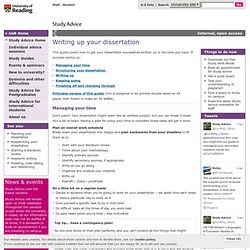

Ten things I wish I'd known before I started my dissertation… Writing a dissertation can be one of the hardest tasks a university student has to accomplish – but it will come to an end.

Photograph: Randy Faris/Corbis The sun is shining but many students won't see the daylight. Because it's that time of year again – dissertation time. Luckily for me, my D-Day (dissertation hand-in day) has already been and gone. But I remember it well. The 10,000-word spiral-bound paper squatted on my desk in various forms of completion was my Allied forces; the history department in-tray was my Normandy. I remember first encountering the Undergraduate Dissertation Handbook, feeling my heart sink at how long the massive file took to download, and began to think about possible (but in hindsight, wildly over-ambitious) topics. 1) If your dissertation supervisor isn't right, change. 3) If they ask follow-up questions, they're probably just being polite. 4) Do not ask friends how much work they've done. 6) A lot of the work you do will not make it into your dissertation.
Media_55761_en. Supervising disabled researchers - Premia - www.vitae.ac.uk/policy-practice. Planning and conducting a dissertation research project. This guide addresses the task of planning and conducting a small research project, such as for an undergraduate or masters’ level dissertation.

It aims to help you develop a clear sense of direction early on in the project, and to support you in organising, planning, and monitoring your project. The companion guide Writing a dissertation focuses on the preparation of the written report or thesis. What is a dissertation? A dissertation is a particular kind of academic task. You will usually be asked to generate a topic for yourself; to plan and execute a project investigating that topic; and to write-up what you did and what your findings were. Choosing a topic;developing a research question;effective planning of the research;being organised and methodical while conducting your research; andreporting the research. Choosing a topic Talk to others: what topics are other students considering? Remember that a research study can: Developing a research question Effective planning of the research. Planning your dissertation. After you have identified your topic, undertaken some preliminary research, and finalised your proposal with your supervisor, there are typically five key stages you must achieve in order to produce the final dissertation effectively.

Take an honest look at the time you have to complete your project and allocate a realistic amount of time to each of these stages, some of which will obviously take longer than others. It is inevitable that you will lose or gain a little time here and there; the important thing is to maintain your focus and keep broadly on track, thus ensuring that no stage becomes compromised due to lack of time. If possible, plan to finish with at least a couple of weeks to spare before the submission deadline - this will give you some protection against delays caused by unexpected problems or illness and also time to do a really thorough job of final editing etc.
Writing up your dissertation. This guide covers how to get your dissertation successfully written up in the time you have.

It includes advice on: Printable version of this guide (this is designed to be printed double-sided on A4 paper, then folded to make an A5 leaflet). Managing your time Don't panic! Your dissertation might seem like an endless project, but you can break it down into a list of tasks. Plan an overall work schedule Break down your dissertation into stages and plan backwards from your deadline to fit them all in. Start with your literature review Think about your methodology Identify primary sources Identify secondary sources, if appropriate Write as you go along Organise and analyse your material Write up Redraft / check / proofread Do a little bit on a regular basis back to top Structuring your dissertation Dissertations based on qualitative or quantitative research are usually organised as follows: Abstract Chapter 1.
Other dissertations may be based around discussions of themes or texts: Chapter 1. Binding.